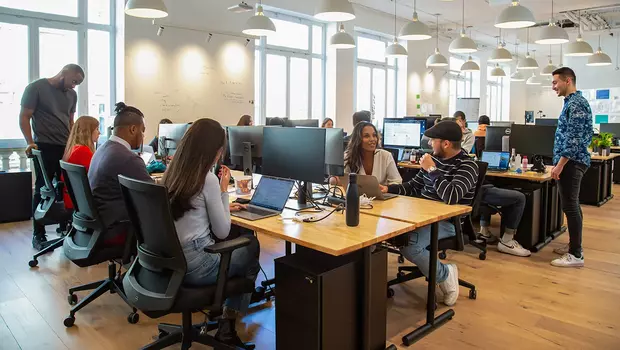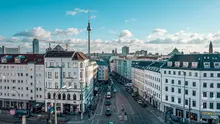Berlin: this is a city you can afford

Berlin is booming. The start-up and tech scenes, as well as top worldwide industries like medical technology, biotechnology and the media landscape, are enticing international professionals to the German capital. Large companies like Tesla, Amazon, BMW and Siemens are developing their sites here; the world’s tech giants (Google, Facebook, Netflix & Co.) have branches here; and the scientific landscape is excellent. Moving to Berlin pays, because there’s one thing we can let you in on: the relationship between earnings and living costs is spot on. In collaboration with Vivian Lie, the founder of Make It Berlin, and Nexus-Europe GmbH, we talk about the current cost of living in the German capital.
In comparison with London or Paris, Berlin is less expensive than other large European cities. The quality of life here is unique, thanks to the city’s exceptional number of green spaces and water expanses, cultural and sports offerings, as well as an excellent transport network, including the increased development of bicycle paths. In Berlin, you have health insurance and access to varied and affordable offers for families and children. For example, a day-care slot costs only 23 euros a month per child. And of course, freedom is a big deal here. In Berlin, you can be exactly who you are – free in your nationality, your traditions and your sexuality. These are the things that make the city so attractive.
Apartment prices in Berlin
Admittedly, it’s hard to find somewhere to live in Berlin. The most important rule when looking for an apartment is: be prepared to compromise! By that, we mean compromising in terms of the size of the apartment and the area. It’s important to look outside the city centre. Berlin has so many beautiful districts that are all well connected to the public transport network. It won’t take you more than 45 minutes to get from A to B here.
On average, a good recommendation is to budget 30 to 40 percent of your net income for monthly rent. The percentage is depends on your final income. The higher your income, the lower the percentage.
If you want to apply for an apartment, make sure that 30 percent of your net income covers the rent. This is the approximate amount landlords in Berlin expect when they grant apartments.
On average, the search for an apartment takes between two and twelve months, which is why we recommend a temporary furnished apartment at first, or perhaps renting a room in a flat share. Housing costs vary – the closer to the city centre you want to live, the more you’ll pay in rent.
For comparison, a furnished apartment for one person (25 m2) costs around 1200 to 1500 euros per month – an unfurnished 30-m2apartment costs between 800 and 1000 euros per month.
A furnished apartment for two people (50 m2) costs around 1400 to 2000 euros a month – a 60-m2unfurnished apartment costs up to 1650 euros per month.
An 85-m2 apartment with three rooms, on the other hand, costs from around 1800 to more than 2000 euros per month. All prices include water, heating and utilities.
If you rent a room in a flat share, you can expect an average monthly rent of 400 to 650 euros. There are additional costs for electricity, gas, internet, telephone and TV, whatever type of housing you go for. We recommend budgeting between 35 to 40 euros for electricity per month. You can find more information on this here.
Everyday costs in Berlin
Everything you need to live is very cheap in Berlin by international standards. For instance, you have several options when it comes to buying food. A monthly shop for one person costs approximately 200 to 300 euros at a discounter (Aldi, Penny, Lidl), around 350 to 450 euros at a classic supermarket (Rewe, Edeka) and around 350 to 500+ euros at an organic supermarket. For products you use every day (shampoo, toothpaste, shower gel, etc.), you only need to budget 30 euros a month for one person.
On top of that, Berlin is also considered to be a “second-hand city”. Whether it’s vintage fashion, children’s clothing, furniture or toys – you can get a lot of high-quality second-hand items in Berlin. Berliners love buying and selling used products. And it’s not only local retailers that are taking advantage of this trend with great second-hand shops - there are also various apps and web portals where you can buy cheaply.
Going out to a restaurant is still particularly affordable in Berlin. You can have a set meal in a fast-food restaurant for as little as 6 to 9 euros per person. A mid-range restaurant costs around 10 to 12 euros per person, and dinner for two with a drink or a glass of wine costs between 40 and 50 euros.
A monthly ticket for the bus, tram, U-Bahn and S-Bahn costs between86 and 107 euros. The price is based on three different zones, stretching from the city centre to the outskirts. An annual ticket will save you a lot more. This costs between 761 and 1008 euros per year. A single ticket valid for 2 hours costs 3 euros and a short journey ticket costs 2 euros.
Our tip
When moving to Berlin from abroad, it’s worth being open and ready to compromise. Don’t forget to check out the outskirts of Berlin for a place to live! Learn about the costs of registration and other necessary steps in the arrival process before you arrive. If you are coming to Berlin for work, tell your future employer about the Business Immigration Service (BIS) in Berlin, which offers assistance in issuing a residence permit, or advise them to support the move with a relocation agency. These tips will save you time, nerves and money.
In conclusion, one thing we can say is: whether you’re just starting your career or well-established in your field – salaries in Berlin are admittedly lower by international standards – but living costs are lower, too. In the end, this balances things out and pushes Berlin ahead in the rankings as a city with a high quality of life and excellent professional prospects. You can find more exciting information all about life and costs in Berlin in our Living in Berlin column.







